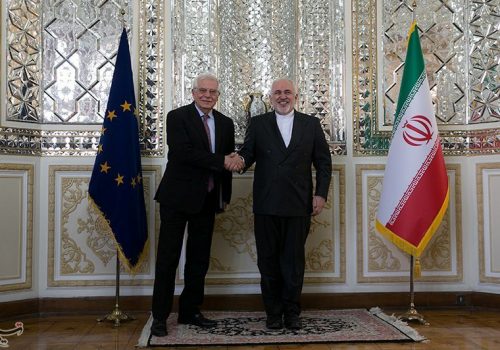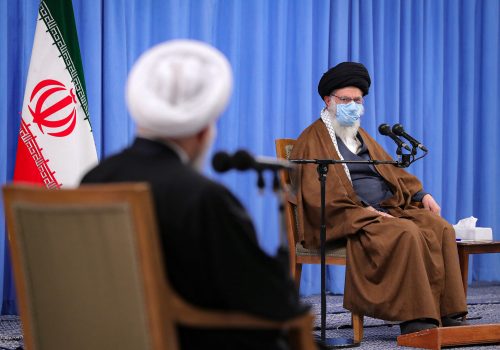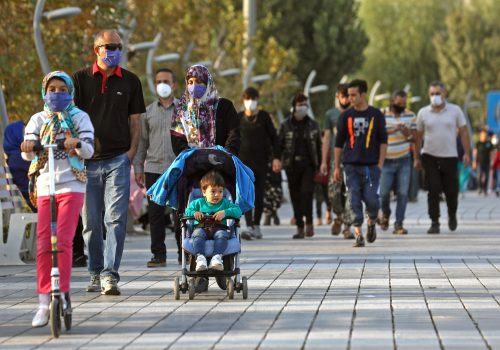Iran’s hardliners think Biden might hurt their June presidential election strategy
The news of Joe Biden’s victory in the United States presidential election on November 7, 2020 came as a big disappointment to the Iranian hardliners seeking to undermine President Hassan Rouhani’s last-ditch effort to save the nuclear accord. They had hoped that Donald Trump’s re-election would help them to oust the reformist and moderate candidates in June’s presidential election. Now hardliners are concerned that the new US administration will destroy their plans.
On January 4, details of legislation proposed by the hardline-led parliament were revealed. The sixteen-paragraph bill included the framework for the Islamic Republic to destroy Israel by the end of 2040. Some hardline lawmakers say that this is a retaliatory action against the US assassination of Quds Force Commander Qasem Soleimani in January 2020. The legislation also calls for the expulsion of US troops from the Middle East and an end to any future negotiations with Washington—a reference to the Joint Comprehensive Plan of Action (JCPOA). The bill explicitly states that any bilateral or multilateral talks with Washington are prohibited unless the US government officially apologizes for its 2018 withdrawal from the JCPOA and Soleimani’s killing. It adds that any government official who fails to abide by this will lose their job and be barred from holding future government positions.
Hardliners are taking every measure to pave the way for an extremist candidate to come to power in the June 2021 presidential election. Prior to Biden’s victory, they were almost certain that the upcoming election would be a race between hardline candidates. From their perspective, reformist and moderate candidates had lost their support base and had no chance of winning. But Biden’s victory has upset the hardliners’ equations and they are now doing everything they can to prevent the revival of the 2015 nuclear deal. They know that reviving the JCPOA means giving the reformists and moderates a second chance in the upcoming presidential election.
Hardliners criticize the US
This was not the only attempt by hardliners to prevent the Rouhani administration from holding talks with the Biden administration. Hossein Shariatmadari, the editor-in-chief of Kayhan daily, who was appointed to the post by the Supreme Leader, lashed out at Rouhani in a January 7 editorial for his willingness to negotiate with the new US administration. Shariatmadari was referring to a January 6 speech in which the Iranian president had said, “If the United States repents and returns to the path of law (JCPOA), Iran will accept its repentance.”
In his editorial, Shariatmadari criticized Rouhani, noting that even though the Iranian president called himself a law expert, his statements showed that he does not know anything about law. “Was it not dirty-mouth Biden who shamelessly said that no one in the United States was affected by the assassination of General Soleimani,” he wrote in the piece, stressing that he could not see any difference between Biden and Trump. Similar dismay was expressed in Kayhan in November 2020, when Shariatmadari wrote, “Biden’s political background shows that he has always had anti-Iranian policies and has not missed any opportunity to be hostile to the Islamic Republic of Iran.”
Shariatmadari’s views are shared by most hardliners, who have made every effort to impede talks with the new US administration. On January 9, Ahmad Amiri Farahani, a hardline member of parliament representing the holy city of Qom, threatened that Iran would expel all International Atomic Energy Agency (IAEA) inspectors if US sanctions on Iran—particularly banking and oil-related sanctions—were not lifted by February 21. The new law, Strategic Action Plan to Counter Sanctions, is a response to the assassination of Iran’s top nuclear scientist Mohsen Fakhrizadeh—allegedly by Israel—in November 2020. Some hardline lawmakers blame IAEA inspectors for revealing Fakhrizadeh’s name and background in their reports, thereby making it possible for assassins to identify for him.
Farahani also threatened that Iran’s next step would be halting voluntary implementation of the Additional Protocol if sanctions were not lifted. The parliament’s deadline would mean that Biden only has one month to lift sanctions reimposed by the Trump administration after its withdrawal from the JCPOA in May 2018.
Expelling IAEA inspectors was also emphasized on January 11 by Fereidoun Abbasi, the chairman of the parliament’s Energy Committee, who led the Atomic Energy Organization of Iran (AEOI) from 2011-2013. He invoked legislation passed on December 1, 2020 that required the AEOI to increase uranium enrichment to 20 percent within two months, which has been carried out so far. It also called for the cessation of the voluntarily implementation of the Additional Protocol that endorses unannounced IAEA inspections if sanctions are not lifted.
Echoing Shariatmadari, Mahdi Mohammadi, the Adviser to the Speaker of the Parliament for Strategic Affairs, ruled out any differences between Trump and Biden on a television interview on January 9. He said that, “Biden’s foreign policy is not different from that of Trump in principle and, like Trump, he will pursue sanctions and seek to expand the JCPOA to cover missile and regional issues. The only difference between Trump and Biden is that the latter will try to keep up maximum pressure using the JCPOA.”
Hardliners have different takes on the US
The hardliner approach to the US has different features. Some hardliners believe that the US is not trustworthy and consider its foreign policy unalterable. This group believes that Israel and, to some extent, Saudi Arabia, influence US foreign policy in the Middle East regardless of who is in the White House.
However, other hardliners believe that there are some differences between the Democratic and Republican parties. At the same time, this group thinks that Rouhani should not be allowed to benefit from the new US administration during his last five months in power given the upcoming June presidential elections. President Rouhani came to power in 2013 by promising to resolve the nuclear issue and lift international sanctions on Iran. He then went on to spend all his political capital on the nuclear file and reaching a nuclear agreement with the West. Now that the JCPOA is on the verge of collapse due to Trump’s maximum pressure policy, hardliners see it as a great opportunity to attack Rouhani’s administration and turn Iranian voters against factions backed by him.
The hardliners in parliament are well-aware that their latest legislation will inflict damage on the Rouhani government’s bid to negotiate. Their ultimate goal is to prevent reaching new agreements with the West to revive the JCPOA while Rouhani is still in office. To do this, the hardliners need to tie Rouhani’s hands as tight as possible.
More importantly, hardliners are concerned that Rouhani can turn the tide in favor of allied candidates in the upcoming presidential race by reviving the deal and basking in the subsequent economic recovery. The president knows their game very well. Immediately after parliament passed the controversial first bill, Rouhani said that his administration was opposed to it: “Do not rush [to conclusions]. Do not worry that this government will end the problems, if the government succeeds, it will give it [the entire achievements] to you altogether. Let’s do our job and let those who have a lot of experience and have succeeded in diplomacy do their jobs.”
All things considered, time is running out for the Rouhani administration. The Iranian president has very difficult months ahead of him before he leaves office. Rouhani’s influential political rivals will do their best to deprive him of reviving the JCPOA before the end of his government. This is all occurring while Biden has just been inaugurated and is still assembling his team. The longer Rouhani waits, the more likely dialogue between Tehran and Washington won’t happen.
Saeid Jafari is a Middle East analyst based in Europe. He has written for various outlets including Foreign Policy, Al-Monitor, Middle East Eye. Follow him on Twitter: @jafariysaeid.
Image: Iranian Presidential candidate Ebrahim Raisi (L) and Tehran Mayor Mohammad Baqer Qalibaf gesture during a campaign meeting at the Mosalla mosque in Tehran, Iran, May 16, 2017. Picture taken May 16, 2017. TIMA via REUTERS


